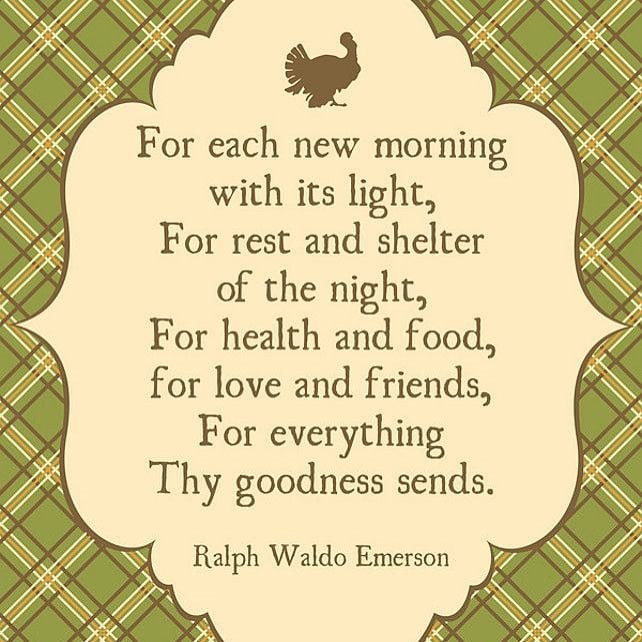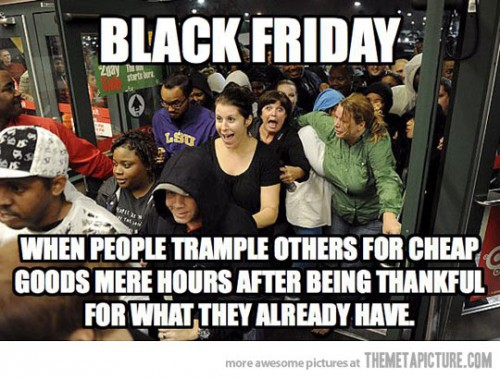|
|
18 - The magic, spiritual number. ONE - The ONENESS that is ALL. All there ever was; All there ever is; All there will ever BE! (8) INFINITY - The ETERNAL PRESENT Moment. Eternity; Forever! That which was never born; never dies!
|
I believe God wants you to know ... ... that life is
about your soul, not about your body and not about your mind. Most people work
hard to keep the body happy. Then they seek to
stimulate their mind. Then...if there is time... they look after
their soul. Yet the most beneficial priority has it just the
other way around. When was the last
time you paid attention to your soul? |
|
Thanksgiving is bloody, both in history and in present. I’ve written about both for many years, including here and here, and dozens of other Elephant writers have done so, too.
But it’s also just about my favorite holiday, perhaps, as it is for so many of us. It’s about friends, and community, and family, and slowing down, and sitting down to eat, and talk, and listen, and come together in this age when no one comes together but everyone comments and yells and replies and hates on and calls out.
So let us acknowledge what it was, and is, and then drop that, and move into something that creates more love, not more suffering.~

1. Let’s not buy a conventional turkey. Free-range doesn’t mean much. Let’s go out of our way to support small farmers and healthy turkeys. We are what we eat. Conventional turkeys are tortured for life, no exaggeration, and we’re eating a baby and stealing said baby away from mommy and we breed them to be too fat to walk or scratch an itch. Buy a well-treated, healthy bird who gets to walk outside, or go veggie (here’s Thanksgiving recipes).
I’m a vegan boy and there’s lots of lovely yummy alternatives (including adopting a turkey!).
2. Right now, let’s all post on our IG, Tiktok, Facebook, or text or email out…an invitation to an “orphan.” Many college kids and single folk don’t have a family to celebrate with. I should know–for years I’ve bounced around to various family dinners, and every invite has made all the difference in my life, filling me with gratitude where loneliness would have been.
Corollary: if you are alone, make sure to “treat yo’self”: be honest with yourself about your emotions, but also remember to shrug and say “oh well” and let them go. Meditation practice helps. Make a happy sweet best of it. Take lots of baths, watch wonderful cozy movies with your pets if you got ’em, facetime with family and loved ones, fall in love with a good book, you know.
3. Don’t engage in the same old toxic family relationships. Take a step back, and let go of our self-righteousness, and let go of our preconceptions of mean old Uncle Bobby or whomever. At the same time, give yourself a break from them if you need it. Support your partner if they’re struggling with your, or their family.
4. Get that bike out of your parent’s garage, or wherever you’re visiting, and give it a spin. It’ll make us happy. Don’t like to bike? Go for a long walk a day, and keep the unwanted weight gain at bay. At the same time, if you are out of the shape you’d like to be in, be kind and honest to and with yourself. No beating yourself up, no guilt tripping.
5. Enjoy your food, bite by bite. Here’s how. Eat real food (including pumpkin and cranberries!), not too much, and mostly plants (Thanks, Mike).
6. Meditate (again here’s how) in the morning. This will help us to appreciate ourselves, our loved ones, our family, and the gaps in between a sometimes-claustrophobic holiday. Or, do yoga.

8. Help someone else by doing buying the needy food (here’s a shopping list), or engaging in a random act of kindness. We may find the person we’re helping most in doing so is our own sweet tired harried selfish self.
9. Find yourself in a bad mood? Go outside. Breathe deeply, and look at the universe above, and feel the ground below, and breathe deeply again, and feel gratitude in your heart for something, anything, and breathe out, and let go.
10. Say thank you.
Giving thanks—and meaning it—is the shortest, easiest, fun-est route to happiness ever “invented.” Let’s do so. Thank you, dear readers, for helping us serve you (we mean that—we aim to be of benefit), and enabling us to pay our wonderful team. We promise to remain independent, to do our best, and to mess up. Stick with us, and we’ll stick with you.
With thanks, Waylon.

Waylon Lewis, founder of Elephant Journal & host of Walk the Talk Show with Waylon Lewis, is a 1st generation American Buddhist “Dharma Brat.” Voted #1 in U.S. … Read full bio

Your sister-in-law demands to know if you eat this way because you think you’re fat or something (then whispers to your brother that she thinks you might have an eating disorder) and your grandmother accuses you of being a part of the “University Liberal Elite.”
All because you don’t eat meat.
Thanksgiving can be a challenging holiday for vegetarians. The day is symbolized by a meat-centric feast after all, and vegetarians are still a minority (though a growing one) in our society. Vegetarians can feel isolated, even attacked on Thanksgiving, because of their diets, but the good news is that it’s easy to have an awesome, plant-based Thanksgiving and still get along with carnivorous loved ones.
Here’s how:
There’s more to Thanksgiving than food, believe it or not.
Don’t focus the celebration on the meal, which is just a small part of an entire day. Channel positive energy into decorating, enjoying the football game, catching up with friends and family from out of town.
Take a long, leisurely after dinner walk with loved ones and delight in the autumn weather or play board games with the kids.
Let it go.
The stupid tofurkey and rabbit food comments, the ignorant questions, and the eye-rolls that people think the vegetarians don’t notice? Forget them all. None of it matters. We all have a choice in how we respond to others and the best choice is to ignore everything that doesn’t serve us. Vegetarians don’t owe anyone an explanation or a defense for their dietary choices. Smile and change the subject.
What anyone eats is no one else’s business.
Likewise, what other people eat is none of your business. Save any proselytizing for another day. Sure, the abuse of turkeys in factory farms may be horrifying, but don’t bring it up in the middle of dinner. Doing so will only cause meat-eaters to go on the defense. Practice detachment.
We are all are on our own paths in life and must be given the freedom to learn our own lessons (or not). No one can be pushed into seeing or accepting a differing point of view and that is ok. Change must come from within.
Practice empathy and compassion for those who might seem critical.
They may view different choices as a judgment of their choices and resent that even if it isn’t true. Most people have their own issues with food and they may be projecting these issues onto people who eat differently. Reflect love and acceptance to them.
Come prepared with a non-food related, fun activity in which everyone can participate.
Bring craft supplies and have everyone make a Christmas tree ornament. The game “Catchphrase” has made for some hilarious memories in my family as has “Pictionary” and “Scattergories,” and check this out for fun, easy games you can organize easily.
There’s no reason vegetarians have to get stuck eating nothing but rolls and cranberry sauce. Bring a protein, a side or two and a dessert that everyone can enjoy.
Roast halved Brussels sprouts and halved red grapes with olive oil and sea salt at 450 degrees for about 20 minutes. Toss in some walnuts five minutes before the sprouts are done. Season and drizzle with balsamic vinegar before serving. Everyone will love it, except maybe the five year olds. Here’s the full recipe.
Make a big salad. My favorite Thanksgiving salad includes Boston lettuce, fresh corn, chick peas, pistachios, dried cranberries, diced green apples and cubed avocado. Toss with a citrusy vinaigrette and top with feta or blue cheese crumbles. Leave them off for vegans and no one will know the difference.
Put together a gorgeous fruit platter for dessert. Trust me, there will be no complaints.
Bake this vegan pumpkin pie and don’t tell anyone there’s tofu in it.
Be the bartender. Bring the ingredients for a special cocktail or mocktail or use what the hosts have on hand. Either way, annoying relatives are probably a little more tolerable with a couple drinks in them.
Be thankful! Instead of being nervous or looking for ways to feel slighted, train yourself to see the positive. Look for all the things you have to be grateful for and express that gratitude openly.
Thanksgiving is about celebrating our abundance, not the choice to eat lentils instead of dead birds.
This account does not have permission to comment on Elephant Journal.
Contact support with questions.

Victoria Fedden is a writer and a mom from South Florida. Her memoir This is Not My Beautiful Life was published June 2016 by Picador USA. She teaches college writing, and bl… Read full bio

There’s a middle way between rampant cheap Made in China consumerism and condescending anti-whatever…amen to this constructive rant via my friend Tom! ~ ed.
A note, via Tom: “I didn’t go shopping this morning either. I’m not saying people should – I’m just annoyed by all the hypocrites bitching about “consumerism” and how evil others are for shopping today.”
…needs to take a minute and look around the room: $10 says you’re posting from a $1000+ computer or $400 smartphone. If you’re so anti-consumerism, why not use a computer at the library? Why not use pay phones? How’s that for an idea?
Reality: if you live in a relatively wealthy, modern society and you are a consumer – you buy and consume things. When you reposted a Facebook status/photo that contrasts “Black Friday” shopping with starving children in Africa, it makes you look like a shallow, hypocritical, attention-seeker. No one is forcing you to buy shit (why not participate in “Buy Nothing Day“?) but even if you don’t shop today, you are still a consumer.
Abstaining from shopping one day a year doesn’t change that fact, so stop calling the kettle black.
~
This account does not have permission to comment on Elephant Journal.
Contact support with questions.

Waylon Lewis, founder of Elephant Journal & host of Walk the Talk Show with Waylon Lewis, is a 1st generation American Buddhist “Dharma Brat.” Voted #1 in U.S. … Read full bio
This account does not have permission to comment on Elephant Journal.
Contact support with questions.